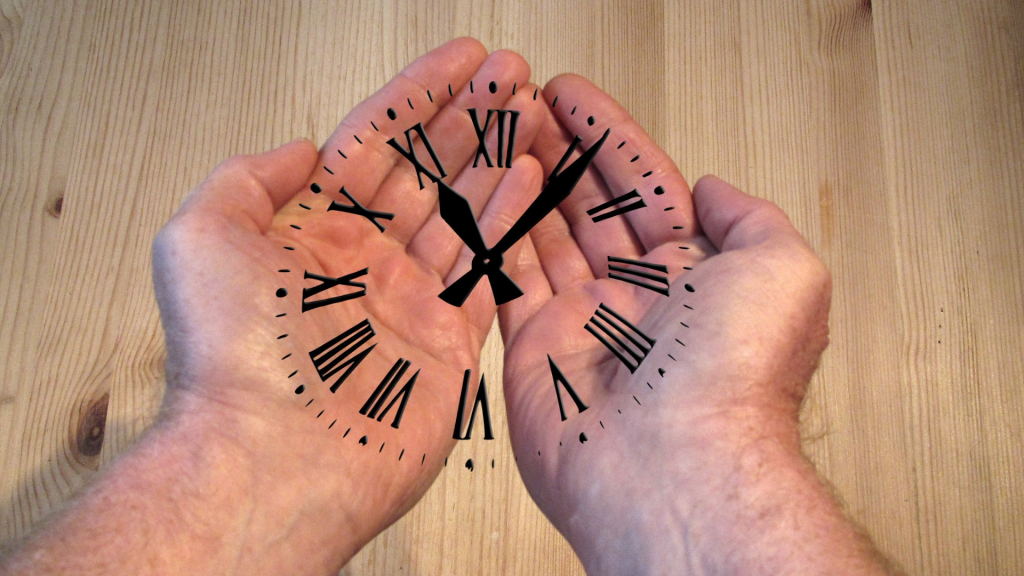For the purposes of this article, I am only interested in the notion of time from the point of view of how people experience it. There are two fundamental ways of experiencing time. There is how we experience time inside ourselves independent of any external events. And there is how we experience time in the external world based on external events. An external world event can be simply the movement of the hands on an old-fashioned clock or it can be a more significant external world event, involving the movement and interaction of external world phenomena including other people.
The first form of time experience is subjective time experience and the second is objective time experience. In subjective time experience, time can be sensed as moving everything from very slow to very fast. Some of this relates to the age of a person. Young people tend to experience life moving more slowly. This is because a young person hasn’t experienced a lot, so that it takes more subjective time to process an event and integrate it into the young person’s mental archive. The older a person gets, the more he has experienced, and the easier it is to integrate an event into his psyche by matching it with clusters of previous events.
Subjective time is experienced through flowing blendable continual organic stimuli. It is not only experience in terms of slow or fast but also in terms of sliding back and forth between slow and fast and even pulsating like an organic rhythm. On the other hand, objective time is experienced through defined discrete more mechanical measured stimuli. It is here where we get points on a line or a clock face or numbers on a digital clock to measure precise quantities of time. As machines and computers have taken over more and more of our daily life processes, objective time has become more and more dominant in its influence on human life. The precise public events that we can feel intersubjectively have increasingly more relevance to our lives than the more imprecise private experiences that we experience within ourselves. As we become numb to ourselves through a gradual loss of feeling of our private experiences, it is no wonder that so many people have to go to psychotherapists to activate their world of private experiences again. The biggest trauma that we all face may not be some jagged tension-pocket experience or experiences towards which we felt helpless and overwhelmed, but rather the growing numbness of our private worlds and of our parents’ private worlds as a result of being so immersed in a frictionless mediated living environment. To the extent that we live subjectively in an experiential vacuum, we don’t feel the movements and interactions that occur in our mechanized external world. The lack of capacity to really experience these movements and interactions results in our languishing in a living death. Our experience of this experiential vacuum puts us in a kind of psychological prison without walls from which it is difficult to exit.
To summarize, in modern technological society, there increasingly develop two different types of time that people are aware of: the movements of machines and machine parts as they but and clatter against each other and create pure external world events in objective time and the growing sense of a vacuum in subjective time, as people grow extremely numb from the lack of organic stimulation in their external worlds. This lack of connection between external world and internal world times contributes to people feeling even more isolated from their surroundings, more off-balance, less capable of fully functioning, as people. People experience themselves as floating through space in their heads, constantly trying to grapple with the delimited oases of tension-pocket abrasive stimuli that momentarily shock the people into life and give them a defined discrete sense of consciousness.
To a certain extent, we can say that human consciousness in modern technological society is based on lots of mini-shocks from butting into all the mechanistic interactions that so totally dominate in today’s world. But as digital technology increasingly replaces other types of technology in the narrative of our daily lives and our lives become more vacuum and less tension-pocket, we increasingly sink into a kind of post-consciousness, where life seems almost static. We lose the traction to keep our narrative alive in a meaningful way. We lose our capacity to feel vibrantly alive in subjective time and, increasingly, abrasively alive from the shocks we can encounter in objective time. And it is at this point where people feel a need to find stronger shocks within objective time to keep them feeling alive. Everything from addictions to strong drugs like the opioids, and mass violence to becoming a part of extremist political cults like that of Trump. All of these shock experiences involve the potential for a certain amount of self-hurt, self-destruction in one’s attempt to pull out of a feeling of infinite timelessness in the experiential vacuum so that one can then slide back into the more tolerable shocks involved in living in objective time.


























